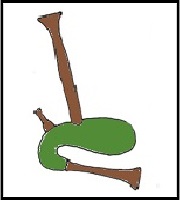The History of Lincoln Waites
Broadsheets
It is very likely that Lincoln's Waits would have known and sung "Broadside Ballads". These songs were a very popular source of news and entertainment from the 16th Century right up to the early 20th Century. Broadsides originally had no written music, but there was usually a note of what well known tune the lyrics could be sung to. Broadsides were popular in Britain, Holland, France, Italy, Spain and Germany and later in America.
Early broadsides were printed in Black Letter (Gothic) print, and are therefore often called black-letter ballads. Around 1700 black letter typeset was replaced by roman type. Broadsides in roman type are called white letter ballads. The earliest broadsides to popular tunes appear in the 1500s. A Lytel Geste of Robyne Hood was printed on a pamphlet circa 1506. In 1520 a bookseller in Oxford sold more than 190 ballads. In an era before literacy was common their popularity was extraordinary.
The 19th century saw a tremendous surge in the popularity of broadsides, but this was short-lived. By the early 20th century newspapers were replacing broadsides.
One particular Broadsheet has strong links with Lincoln Corporation, as the sheet itself clearly states, "as sung at the Rein-Deer Inn". This was the Inn, near to the Guildhall, where the Council would meet, and where Lincoln's Mayors held numerous Dinners and Entertainments every year, for hundreds of years. This Song is from the Curtois Collection and is entitled "King, Liberty, Laws". One of the Curtois family - Thomas - became a Wait in 1768 (L1/1/1/7, p511).
- The Curtois Song: King, Liberty, Laws circa.1792-1809
More Broadsheets. Although these additional songs definitely have a Lincolnshire connection, I am not claiming particular links to the City of Lincoln Waites, unless stated in my comments on each particular one. They certainly do serve as examples of the type of news content usually found in Broadsheets. The Waites would have no less opportunity to purchase and sing from the Broadsheets of their day, than anyone else.
- (The) Lincolnshire Farmer (17th and 18th Century)
- (The) Lincolnshire Farmer's Daughter (c.1650-1850)
- Lincoln Races (1798)
- Cocky and the Bull (some time after 1799)
- (The) Murder at Sibsey (1859)
- Sibthorp for Ever (1826 - 1837)
- (The) Wife Murder at Boston (1871)








